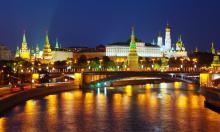C o m m e n t a r y army to learn new fighting techniques
On December 1, the armed forces of the Russian Federation begin a new academic year. The present academic year will see some innovations. Programmes for combat training, as Colonel-General Nikolai Kormiltsev, commander-in-chief of the ground forces, told the RIA Novosti military analyst, will be slightly re-orientated towards studying methods and techniques of fighting terrorists. Mainly this will concern the tactics of conducting independent operations by different combined groups and detachments, platoons and sections in outflanking and raid operations, searching for militants, their bases and caches in the mountains and wooded areas, as well as organising combat operations in encirclement or when pulling out of such an encirclement, in fire ambushes, at road blocks, and in outposts in battle and at the halt. Naturally, the general said, account will be taken of the experience of our army, accumulated during its military operations in Chechnya.
Serious changes will be made in such themes as practising the tasks of reliably protecting and defending key military and economic facilities. Many of such facilities -- nuclear power stations, hydro-electric power schemes, chemical and other hazardous plants, military arsenals, and arms dumps, General Kormiltsev emphasised, attract all sorts of terrorists like a magnet. This is shown by international and indeed our own experience. And to learn to protect and defend them reliably, which incidentally has been done for some time past, especially in the strategic missile forces, is one of the major objectives of military units. "We will continue improving this work further, using new technical means and weapons," the commander-in-chief remarked.
He also said that some aspects of anti-terrorist struggle will be included in the curricula of higher education establishments of the ground forces, although there will be no undue emphasis on them or fundamental changes in the basic training of armed forces. Their main mission remains to build up their combat capability and be ready to solve the whole range of objectives to ensure the country's security. And here, to concentrate on something particular would probably be short-sighted.
True, far from all military professionals think that changes in the programmes of combat training of the army may have a substantial influence on its readiness to oppose terrorism. General of the Army Andrei Nikolayev, chairman of the defence committee of the State Duma (lower house of parliament), told the RIA Novosti military analyst that "it is unrealistic to adjust or reorganise the armed forces for fighting terrorism". It is necessary to set up a command of special forces and specially integrated troops, which would be able adequately to respond to these asymmetrical (not comparable to the possibilities and tasks of regular troops) challenges and threats set before them both by international and domestic terrorism. This command and similar troops will become one of the elements of military reform, being insistently demanded from us by time, and by the situation in the country and outside its boundaries.
Special forces, Nikolayev believes, must also get a special legislative framework based on international military law not, for example, to cause PACE or the OSCE to ask puzzled questions about the status of the military operation being carried out in Chechnya by our units. Anti-guerrilla and anti-terrorist forces, the defence committee chairman said, must have legal rights for operational search activity, for intelligence and counter-intelligence operations, for combat in mountainous and wooded areas, as well as in populated localities. To formulate such rights is the goal of lawmakers. And this they must start doing at once. Besides, such troops should be provided quickly with facilities for electronic counter-measures and with communications facilities, meaning space communications, with coding systems, as well as unorthodox types of weapons, including those with non-lethal effects, with air and ground transport, and other kinds of combat and special logistics.
Campaigns of anti-terrorist forces should be supported with air and ground means of technical reconnaissance, with reconnaissance and strike systems, and other high-precision and high-efficiency weapons capable of inflicting damage on militants. Without such a comprehensive and all-round approach the military problem of anti-terrorist struggle cannot be solved, believes General Nikolayev.
Such an approach is now being elaborated in the leadership of the army and the country, as a gathering of commanders of military districts and fleets, and all services and arms, held in Moscow ahead of the new academic year, has shown. And the faster this task is accomplished, the sooner and more reliably we will crush the evil of terrorism.
Subscribe to Pravda.Ru Telegram channel, Facebook, RSS!



